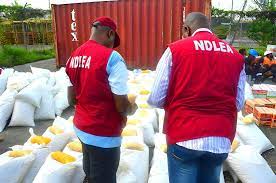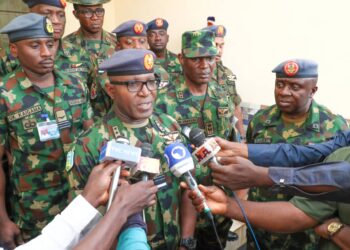The Chief of Defence Staff, General Lucky Irabor, has stated that old weapons and tactics are not suited to defeat asymmetric warfare like kidnapping and Boko Haram insurgency, hence the need for new platforms.
The CDS noted that long-term success against terrorism, insurgency, banditry and other internal security challenges require a total approach rather than just a military solution, hence the resolve of the military to acquire new platforms to address them adequately.
He addressed a Regimental Dinner organised in honour of the graduating students of Senior Course 43 of Armed Forces Command and Staff College Jaji, Kaduna state on Wednesday as the Special Guest of Honour. The graduating students, in the ranks of Major and its equivalence are to assume new responsibilities as mid-level commanders.
Gen. Irabor said the involvement of military in containing asymmetric security threats in the past few years has highlighted the need to acquire new operational capability of the Armed Forces of Nigeria to deal with emergent threats. Accordingly, we are developing new capabilities in intelligence and surveillance, which are critical for staying ahead of terrorists and insurgents, and other criminal elements in the society.
“As you are aware, asymmetric warfare encourages the use of non-traditional military tactics for which our previous training and operational doctrines were not well suited. Nigeria is currently contending with a number of asymmetric threats. The most visible of these threats is the terrorism and insurgency by the Boko Haram in the North-East.
“Equally disturbing is the herders-farmers conflicts in some parts of the country, which recently have attained a worrisome dimension with different interpretations of the causes of the conflict and personalities involved. This is coupled with other varying acts of criminalities that are characterised by banditry, kidnapping among others. The involvement of the armed forces in the management of such internal crises requires a complex interplay of many factors.
“As mid-level commanders, your role becomes even more challenging when operating in an operational environment that is intricately woven and influenced by many factors and several differing actors, most of which are not defined by military necessities. Expectedly, such complex security environment will require new capabilities and also portend several challenges to military and security practitioners.
“One major success determinant in a complex security environment is for you to have a thorough understanding of the dynamics that define the crisis you are deployed to contain, and the interplay of the various actors. This understanding will ensure that you exhibit clear thought and adequate judgement in decision making even when under pressure. It will also guide you from the manipulative tendencies of some parties to the conflict.
“You must remember that as a commander, and indeed as a member of the armed forces, you are required to be apolitical and neutral in your decision making and subsequent actions.
Speaking on the steps taken by the military command to address new threats, General Irabor said, “the curriculum of our training institutions across the services are constantly being reviewed and our new platform acquisitions are being focused to acquire new set of capabilities that address asymmetric threats. We cannot use old tools to address new threats.
“Accordingly, we are developing new capabilities in intelligence and surveillance, which are critical for staying ahead of terrorists and insurgents, and other criminal elements in the society.
“The Defence Headquarters as well as the services are utilising their Special Forces Units, which have been force multipliers and have proven to be critical in asymmetric warfare because of several unique capabilities they can bring into combat, including operating in small teams over extended period in difficult terrain.
“We are also giving our officers and soldiers specialist skills to address the problems of terrorism and insurgency. I have been informed that the curriculum of the College, which you have gone through in the last 11 months, is in line with these realities.
“The actions of the military merely serve to create the necessary conditions for other agencies of government to function in the restoration of long-term peace and security to the crises areas. You must understand and appreciate the important roles of other security agencies in the overall security architecture,” the CDS said.




